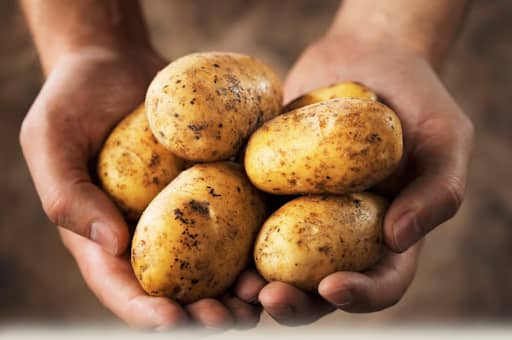
…..Potato Varieties Have Been Bred in Nigeria
Nigeria is making big moves in farming, especially with potatoes. As the world faces changes in weather and the economy, it’s more important than ever for countries to rely on themselves. Nigeria’s new potato crops might be a key solution. This could boost both the economy and make sure there’s enough food for everyone.
New potato varieties in Nigeria are a real breakthrough not only for the country but also for agriculture around the world. Just like bet Senegal, this is a breakthrough in the betting world. In this article, we will tell you about four new types of potatoes in Nigeria, and how they will affect agriculture, the economy, and the future!
Introducing New Potato Varieties
For the first time in over a decade, Nigeria has introduced new potato varieties. This move aims to reduce reliance on European potato seeds and grow local production.
Nigeria’s Potato Initiative
The Nigerian Potato Seed Safety Partnership (NPSSP), sponsored by Germany’s GIZ, recently launched four potato types. These new breeds resist the late blight disease and are tailored for Nigeria’s climate. Viviana Infantas of the International Potato Center (CIP) notes that these varieties ensure quality seed potatoes for the local market.
Teaming up with the Nigerian National Research Institute of Root Crops (NRCRI) and Fruit and Veggies Global Ltd., NPSSP secured permission to distribute four varieties: Unica, Juriya, Babban, and Kyau by the end of June.
Dr. Egesi of NRCRI stated, “These potatoes are special. They produce well, and resist diseases and heat, making them perfect for Nigeria.” Their introduction is a leap forward, merging advanced breeding methods from the CIP and Nigeria’s National Program. Beyond being productive, these potatoes appeal to local tastes and uses.
Why Focus on Potatoes?
Potatoes are crucial for Nigeria, especially in the highlands. But there’s a problem. The country produces only 3-4 tons per hectare, insufficient for the rising demand. The COVID-19 crisis hampered European seed imports, which historically met only part of Nigeria’s demand. This disruption highlighted the need for boosting local production for food security.
Dr. Kalpana Sharma from CIP believes these new varieties are game-changers. “They make the local industry more robust,” she said, “Empowering potato growers to tackle future challenges, ensuring a thriving sector.”
Implications for the Future
Nigeria’s initiative in boosting its local potato industry serves as a profound case study for several reasons.
- Diverse Economy: By focusing on potato farming, Nigeria is diversifying its economy. This shift not only secures food but also creates jobs, moving away from heavy reliance on oil.
- Facing Climate Change: Global climate change impacts crops. Nigeria is ahead of the game by developing potatoes that can handle these changes.
- Self-Reliance: Relying less on foreign food imports boosts Nigeria’s independence. This means better control over food prices and quality.
- Tech in Farming: Partnering with global groups like CIP lets Nigerian tap into the latest farming tech, keeping them on the cutting edge.
- Setting An Example: Other countries can look at Nigeria’s efforts as a guide. It shows how to boost agriculture and work well with global partners.
- Sustainability: Investing in agriculture, especially in staple crops, promotes a sustainable approach to food production. It ensures a consistent food supply even in challenging conditions.
- Health and Nutrition: The new potato varieties are not just high yielding but are also nutritious. This could play a part in addressing malnutrition and promoting a healthier diet among the population.
- Local Empowerment: By focusing on local production, small-scale farmers get a chance to thrive. This can uplift entire communities, providing them with a steady income and improved living standards.
- Economic Boost: A thriving agricultural sector can increase the country’s GDP. With enhanced potato production, there’s potential for export, further boosting Nigeria’s economy.
- Educational Opportunities: Collaboration with international entities can lead to knowledge transfer. This can result in improved agricultural education and training for Nigerian farmers.
The expansion of Nigeria’s potato industry isn’t just about one crop in one country. It represents a broader narrative of growth, foresight, and collaboration. As global challenges compound, it’s initiatives like these that can shape the future of food security, economic stability, and international cooperation.
A Glimpse into CIP
Founded in 1971, CIP focuses on research concerning potatoes and other root crops. Based in Lima, Peru, they aim to offer affordable nutrition through innovative science. They also strive for sustainable business growth and the stability of root crop systems across 20 countries.
Results
Nigeria’s fresh potato varieties are a pivotal step towards self-reliant agriculture. As nations grapple with challenges like climate change, it’s vital to find resilient solutions for food and economic stability. Partnering with both local and international bodies, Nigeria’s efforts are more than just addressing immediate concerns. They’re sculpting a sustainable agricultural landscape.
This initiative isn’t merely a technical feat. It’s a glowing example of the strength in collaborative efforts between nations and global organizations. Such alliances speed up innovation and bridge knowledge and resource divides.



